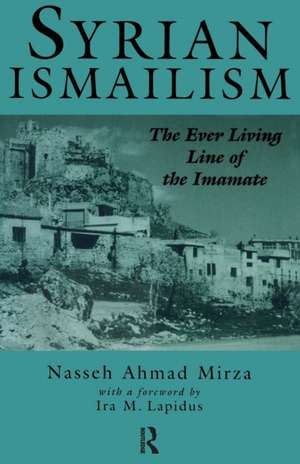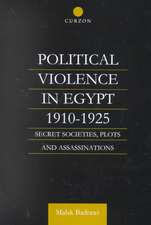Syrian Ismailism: The Ever Living Line of the Imamate, A.D. 1100--1260
Autor Nasseh Ahmad Mirzaen Limba Engleză Paperback – 26 mar 1997
Syrian Ismailism tells the little-known story of the adaptability and survival of Ismailis in Syria in an era which seems as complex and difficult as our own. The late eleventh and twelfth centuries brought severe troubles, including the decline of the Fatimids, divisions among the Ismailis, the Saljuq-Sunni conquest of much of the Middle East, and the Crusades.
| Toate formatele și edițiile | Preț | Express |
|---|---|---|
| Paperback (1) | 399.79 lei 6-8 săpt. | |
| Taylor & Francis – 26 mar 1997 | 399.79 lei 6-8 săpt. | |
| Hardback (1) | 978.73 lei 6-8 săpt. | |
| Taylor & Francis – 10 apr 1997 | 978.73 lei 6-8 săpt. |
Preț: 399.79 lei
Nou
Puncte Express: 600
Preț estimativ în valută:
76.51€ • 79.71$ • 63.61£
76.51€ • 79.71$ • 63.61£
Carte tipărită la comandă
Livrare economică 10-24 februarie 25
Preluare comenzi: 021 569.72.76
Specificații
ISBN-13: 9780700705054
ISBN-10: 0700705058
Pagini: 164
Dimensiuni: 138 x 216 x 13 mm
Greutate: 0.23 kg
Ediția:1
Editura: Taylor & Francis
Colecția Routledge
Locul publicării:Oxford, United Kingdom
ISBN-10: 0700705058
Pagini: 164
Dimensiuni: 138 x 216 x 13 mm
Greutate: 0.23 kg
Ediția:1
Editura: Taylor & Francis
Colecția Routledge
Locul publicării:Oxford, United Kingdom
Cuprins
1: Introduction; One: An Outline of the Political History of the Amirate of Mis?yaf; 2: The Principality of Misyaf under Sinan 1; 3: The Syrian Isma‘ilis from the Death of Sinan to the Fall of Alamut; 4: The Syrian Isma‘ilis under the Early Mamluks; Two: Beliefs and Organization; 5: The Universal Divine Order; 6: The Organization of the Da‘wa; 7: Concluding Remarks: Isma‘ilism in Perspective
Descriere
This is a welcome addition to the scant literature on the Ismaili communities of Syria. In addition to a wide reading of Arabic sources and a deep familiarity with existing scholarly literature, Prof. Mirza brings to light new manuscripts illuminating this history.









